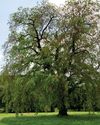
THOSE of us inclined to a large gin and tonic at the end of the day cannot fail to have noticed the rise of the word ‘botanicals’ in recent years. Where juniper, orange peel, angelica and coriander seeds were once the botanicals of choice in gin, these aromatic fruits, herbs and spices are now being joined by an everswelling chorus of ingredients, from pepper- mint and kelp to bog myrtle and Douglas fir.
Although it is perfectly possible to grow your own Douglas fir or juniper (indeed, Juniperus communis is in decline in the UK, so you’d be helping to preserve the species), you would have to wait some time for a worthwhile harvest. Happily, however, there is a host of quick-cropping plants that will serve the same purpose, adding complexity, flavour and character to your drinks—as well as to your salads, jellies, teas or to whatever else you choose to add them.
The following plants are easy to grow and will all attract pollinators to your garden, helping to maintain a healthy ecosystem. You’ll also be reducing your food miles and, if you pick them at their peak and grow them without chemicals, getting top-notch quality, too (organic fresh herbs and specialist ingredients are surprisingly hard to find in the shops). Perhaps the greatest joy of all is how little effort they are. Once planted, simply remember to water in dry spells, mix yourself a drink, pluck a leaf or flower or two to add to it, then sit back and relax.
Lemon verbena (Aloysia citriodora)
Deliciously scented and alluringly sweet, lemon verbena is one of the real delights of an edible garden—although it does need a spot in full sun. Native to South America, it is tender in the UK, so it’s best grown in a pot where it can be brought indoors or into a greenhouse when temperatures drop. Water sparingly over winter and move outside in April, when new leaves will slowly appear.
Diese Geschichte stammt aus der June 05, 2024-Ausgabe von Country Life UK.
Starten Sie Ihre 7-tägige kostenlose Testversion von Magzter GOLD, um auf Tausende kuratierte Premium-Storys sowie über 8.000 Zeitschriften und Zeitungen zuzugreifen.
Bereits Abonnent ? Anmelden
Diese Geschichte stammt aus der June 05, 2024-Ausgabe von Country Life UK.
Starten Sie Ihre 7-tägige kostenlose Testversion von Magzter GOLD, um auf Tausende kuratierte Premium-Storys sowie über 8.000 Zeitschriften und Zeitungen zuzugreifen.
Bereits Abonnent? Anmelden

A leap in the dark
The primal play of light and shadow, whether in Leonardo's ever-so-subtle sfumato or Caravaggio's dramatic contrasts, has shaped Western art, as Michael Hall reveals

Beauty and the blimp
Inflammable airships may be gone, but a new hybrid aircraft, capable of delivering eco-friendly aviation, is set to take to the skies with a bang, finds Charles Harris

Three wishes for food and farming
Royal hedge planting, the terrible toll on Ukrainian farming and a maiden speech

Seeing the wood for the trees
Scotland's much-evolved forestry industry has become a focus for clever investors

Let's fall in love
Birds do it, bees do it, even educated fleas do it. Laura Parker finds that, when it comes to creatures mating for life, persistence, patience and a little dad dancing are key to success

Back from the dead
THREE Wentworth elm saplings have been planted in the grounds of the Palace of Holyroodhouse, Edinburgh, and on the Highgrove estate in Gloucestershire-29 years after what was thought to be the lastknown Wentworth elm died.

A man among men
What makes a master? Beloved of the commercial art world, handled warily by art historians, the word has long been opaque. Michael Prodger investigates its many meanings-and discovers that being male confers an unfair advantage

Unearth one of life's luxuries
Black diamonds are a girl's best friend this Valentine's Day, with Périgord truffle-based skincare from TRUFFE

Adventure awaits
Spend an unforgettable family holiday on the Benmore Estate and experience some of Scotland's finest wildlife and sporting activities

Let the art rule the head
Despite being a world leader in everything from jewellery to fashion and music, the UK is failing to nurture creativity at school and in regional centres. Tristram Hunt, director of the V&A Museum, calls for an urgent review